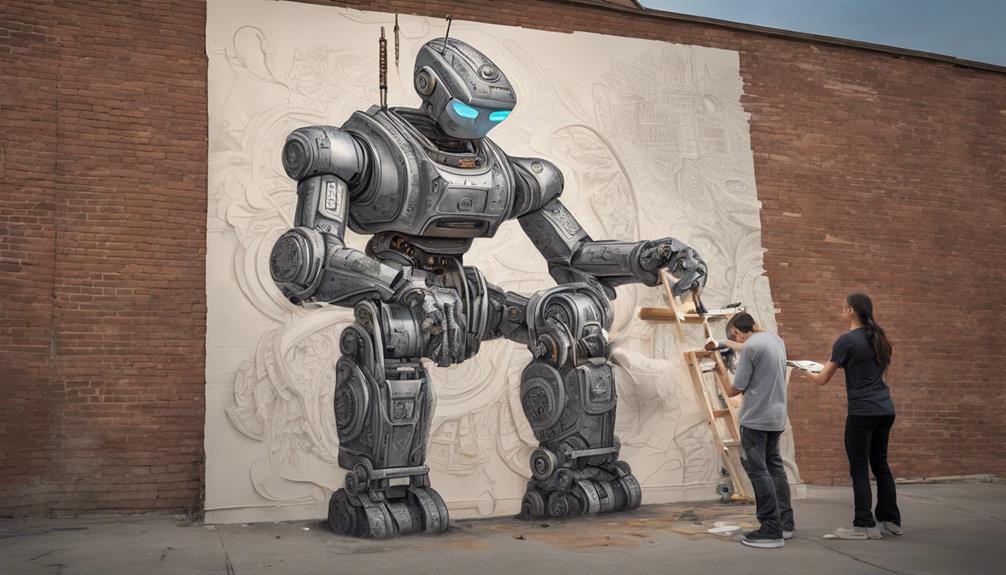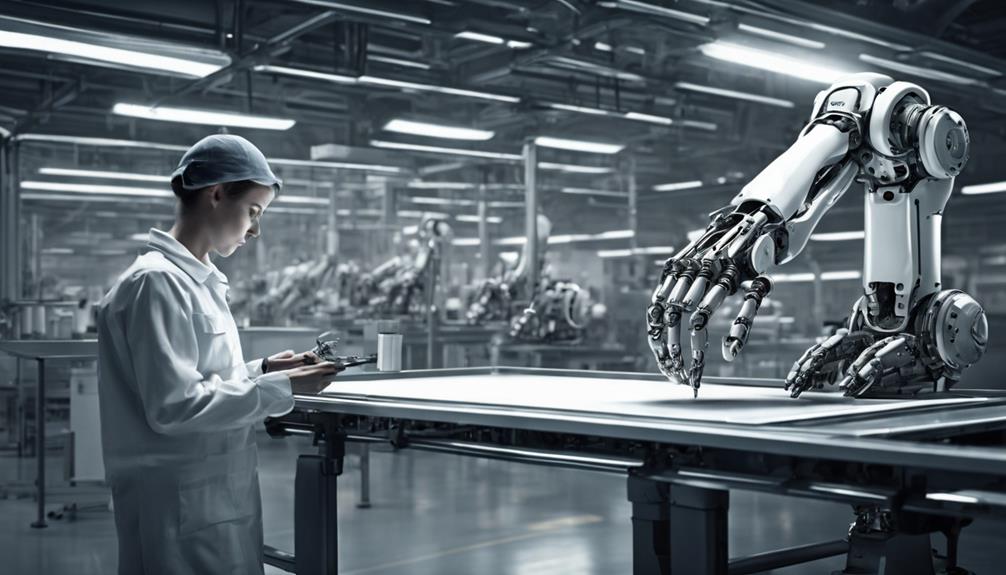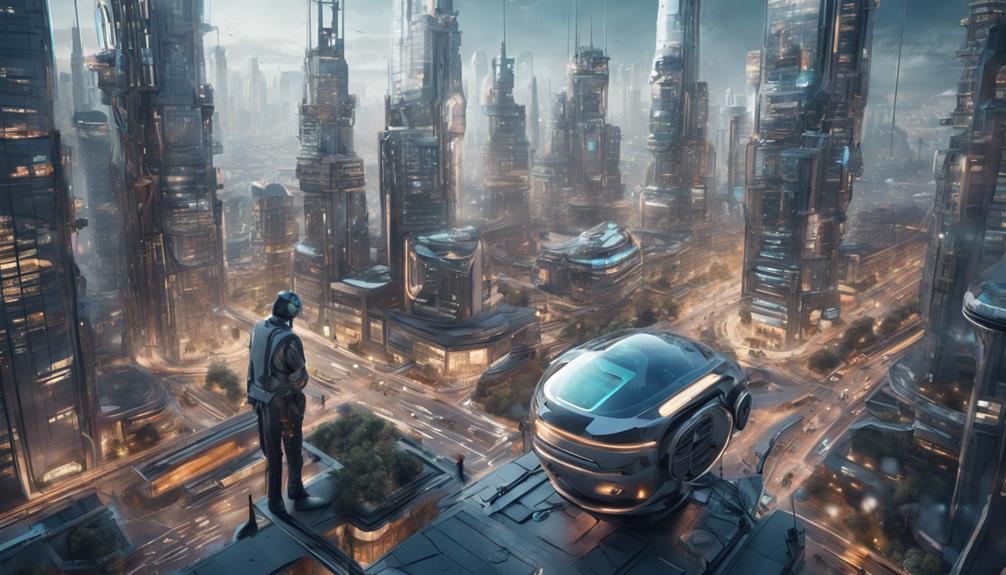The growing importance of artificial intelligence (AI) on job trends is a critical topic in today’s rapidly evolving technology landscape.
As AI continues to automate tasks and disrupt traditional employment sectors, the question of how individuals can effectively adapt to these changes becomes paramount.
With millions of jobs at risk of being replaced by AI in the near future, understanding which professions are most vulnerable, as well as identifying strategies to thrive in an AI-dominated workforce, are crucial considerations.
Join the conversation to explore the nuanced dynamics of how AI is reshaping the job market and discover actionable insights for navigating this new reality.
Key Takeaways
- Prioritize lifelong learning and soft skills for AI job market adaptation.
- Focus on honing skills resistant to automation like critical thinking and creativity.
- Specialize in specific areas and stay agile in acquiring new AI-related skills.
- Institutions offer AI specialization programs to prepare for AI-driven job market.
Impact of AI on Job Market
With the advancement of AI technology, its impact on the job market is becoming increasingly evident, restructuring traditional employment landscapes across various industries globally. AI's ability to perform tasks that once required human intelligence is leading to the replacement of jobs in high levels of demand for workers. This shift necessitates the acquisition of new skills to navigate the changing job market where AI tools are increasingly prevalent.
As AI continues to evolve, workers are compelled to adapt by enhancing their capabilities to complement AI technologies rather than be replaced by them. The demand for workers who can work alongside AI, leveraging its capabilities to optimize productivity, is on the rise. Industries are recognizing the importance of integrating AI into their operations, creating a need for individuals with the skills to operate at the intersection of human intelligence and artificial intelligence effectively.
Adapting to this new reality requires a proactive approach in developing skill sets that align with the evolving job market influenced by AI's transformative presence.
Jobs Vulnerable to AI Disruption

In the evolving landscape of technological advancements, certain occupations face vulnerability to disruption by artificial intelligence (AI).
- Customer Service: AI algorithms are increasingly being employed to handle customer inquiries and support, potentially reducing the need for human customer service representatives.
- White-Collar Workers: Jobs traditionally held by white-collar workers, such as accountants, financial managers, and management consultants, are at risk of being automated by AI technologies.
- Manual Labor: While manual labor jobs have historically been most susceptible to automation, advancements in machine learning and autonomous vehicles now pose a threat to these roles as well.
As AI continues to advance, market trends indicate a shift towards automation in various industries. High school students and professionals alike must consider developing skills in areas such as emotional intelligence and soft skills that are less susceptible to AI disruption.
Adapting to these changes is crucial for individuals to remain competitive in the evolving job market.
Benefits of AI Integration
The integration of AI offers significant advantages for businesses looking to streamline operations and enhance productivity. AI systems can save time by automating repetitive tasks, allowing employees to focus on more strategic and creative projects.
Moreover, AI creates new job opportunities in fields such as machine learning engineering and AI ethics. To excel in these roles, individuals need high-level skills in artificial intelligence and data analysis.
While AI can reduce the need for certain tasks, the human touch remains essential in training, maintaining, and monitoring AI systems. Businesses that are highly exposed to AI benefit from upskilling their workforce to adapt to the changing job market.
Studies show that less than half of companies currently have employees with the necessary AI skills, highlighting the demand for upskilling initiatives. Overall, integrating AI can enhance efficiency, create new jobs, and empower workers with the skills needed to thrive in a technology-driven economy.
Jobs Resistant to AI Takeover

Given the increasing integration of AI in various industries, it is crucial to identify occupations that are least susceptible to automation by AI, such as those involving manual work and skilled labor. When considering jobs resistant to AI takeover, it's evident that roles requiring physical skills, creativity, and manual labor are less likely to be replaced by artificial intelligence. Here are three occupations that fall into this category:
- Sports Players: The dynamic and unpredictable nature of sports requires human creativity and adaptability, making this profession highly resistant to automation.
- Roofers, Construction Workers, Plasterers, Steel Erectors: These occupations involve hands-on manual labor, specialized skills, and problem-solving abilities that are challenging for AI to replicate accurately.
- Occupations Requiring Physical Skills or Creativity: Jobs that demand physical dexterity, artistic flair, or innovation are generally safe from AI intrusion due to the unique human qualities they entail.
Strategies for Adapting to AI
Strategies for effectively adapting to the increasing integration of AI in the job market involve prioritizing lifelong learning and cultivating soft skills essential for navigating evolving industry demands. According to the Future of Jobs Report, skills such as critical thinking, creativity, and emotional intelligence are becoming increasingly high in demand as automation and AI reshape the workforce.
To adapt to the changing job landscape influenced by Artificial Intelligence (AI), individuals must focus on honing these soft skills that are less susceptible to automation. Specializing in specific areas and staying agile in acquiring new skills can also help individuals thrive in AI-transformed industries where adaptability is key.
Institutions like Nexford University offering AI specialization programs are preparing individuals for the future of work by equipping them with the necessary skills to succeed in an AI-driven world. By familiarizing oneself with AI through everyday technology and embracing a mindset of continuous learning and development, individuals can position themselves for success in an increasingly AI-dominated job market.
Frequently Asked Questions
How AI Is Replacing Jobs?
AI is displacing jobs across sectors like customer service, driving, programming, research, and legal support. As automation advances, roles requiring repetitive tasks or data processing are most vulnerable. AI-driven disruptions in employment are expected to increase.
Which Jobs Will Be Taken Over by Ai?
AI is poised to replace roles in customer service, transportation, programming, research, and law. Routine tasks like data entry are most vulnerable. Occupations requiring manual dexterity and creativity are less likely to be automated by AI.
Will Artificial Intelligence Take Over My Job?
Artificial intelligence's rapid advancement raises concerns about its impact on various job sectors globally. As AI technologies evolve, certain roles like customer service representatives, drivers, programmers, analysts, and paralegals face potential displacement, prompting individuals to adapt and upskill.
How AI Is Changing the Job Market?
AI's impact on the job market is profound, reshaping industries and roles. Automation of routine tasks is prevalent, leading to job displacement. This shift necessitates upskilling to adapt to evolving demands, ensuring relevance in a technology-driven workforce.
Conclusion
In conclusion, as artificial intelligence continues to reshape the job market, individuals must adapt by upskilling in AI-related skills and focusing on roles that require uniquely human attributes.
While some professions are at risk of being replaced by AI, jobs that involve complex tasks, creativity, and human interaction are deemed secure.
By embracing new technologies and honing critical thinking and empathy, individuals can navigate the evolving job market shaped by AI with confidence and resilience.









